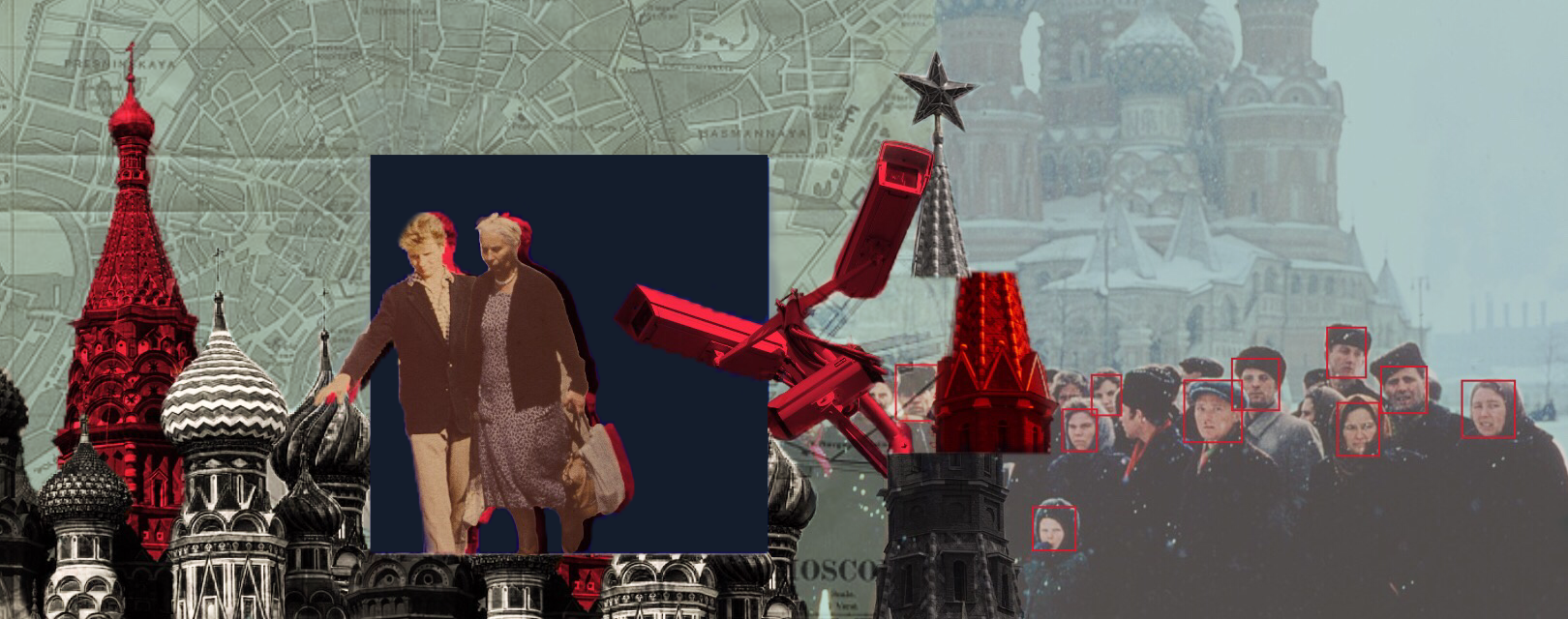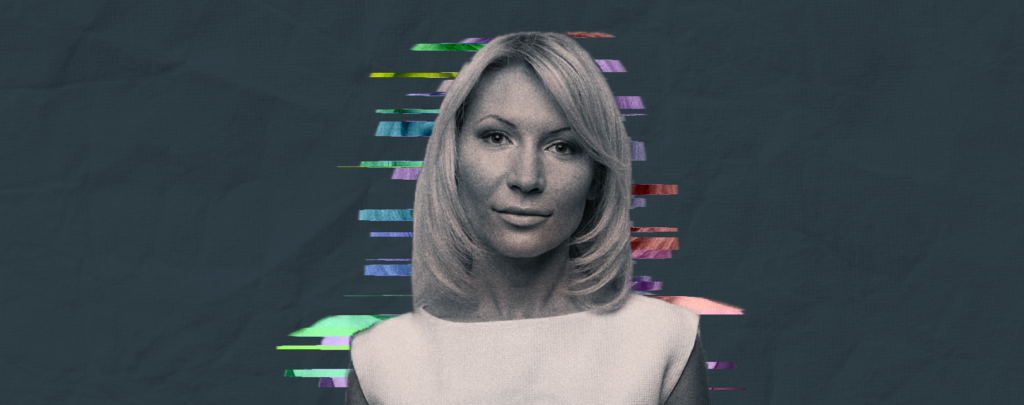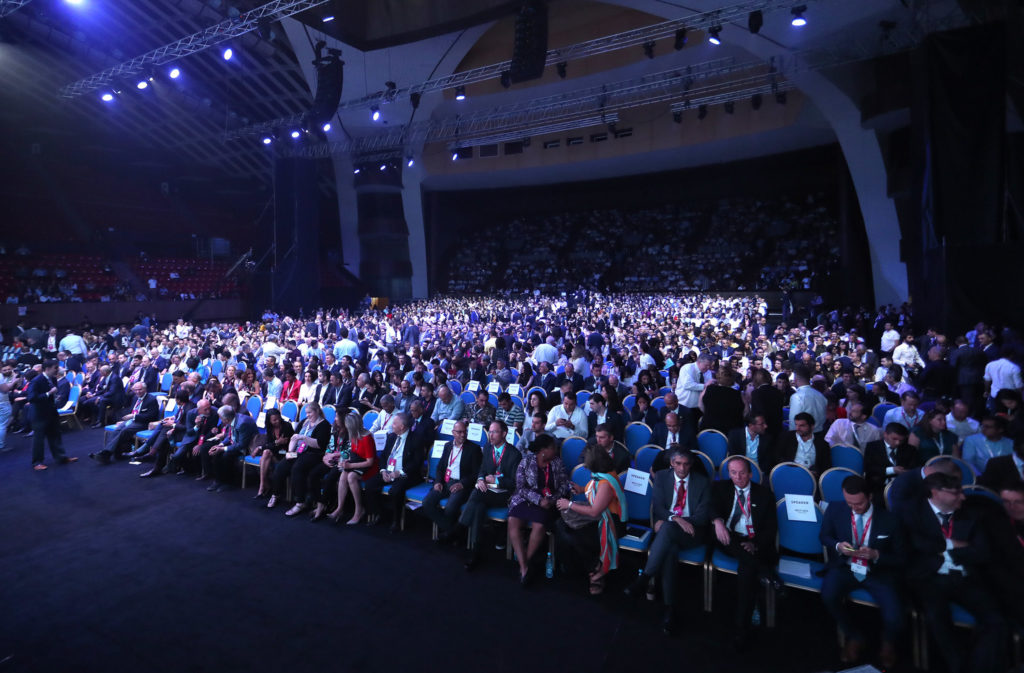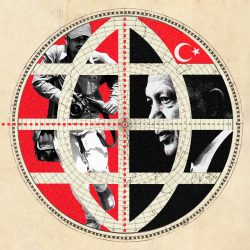
Moscow’s ‘smart city’ program is going global. Russian activists say it targets political opponents
- Photo collages by Anastasia Gviniashvili
- Photos by WCIT and the Moscow Center for innovations
As Russia takes its smart city technology on a global tour, jockeying for a spot as a world leader in the market, one activist in Moscow is suing the city government for using facial recognition cameras to identify and fine her for attending a protest last year.
Earlier this week, Alena Popova, a prominent campaigner for women’s rights, filed a lawsuit arguing that Moscow’s use of city-wide surveillance technology is in violation of Russia’s privacy laws. Her lawsuit stems from a protest outside parliament in April 2018. Popova was subsequently fined $310 after a court ruled she had violated strict local laws related to public gatherings.
Popova’s suit was filed as the Moscow city government exhibited its smart city program at one of the tech industry’s largest international conferences, the World Congress on Information and Technology (WCIT), held in Yerevan, Armenia this week.

The four-day conference hosted dozens of star speakers, including Kim Kardashian West, Alexis Ohanian, founder of Reddit, and Infosys founder Narayana Murthy. The Government of Moscow was a headline sponsor.
But while the Russian delegation presented its smart city technology to the conference’s international attendees as a crime-fighting tool, the same system is used in Moscow to identify and jail protestors, said Popova.
“In reality this is technology that is being used to hunt down political opponents, not criminals,” Popova said.
At Yerevan, the popular Moscow city pavilion was the centerpiece of the conference. A sweeping, uplit smoked glass structure covered with interactive screens showcasing Moscow’s latest technology.
Waiters served canapes and fresh fruit to passing delegates, while Alexey Parabuchev, CEO of Moscow’s Agency of Innovations, presided over the activity. He led us through a discreet glass door into a quieter, walled off enclosure. We asked if other “smart city” surveillance programs — such as those seen in China — had inspired Moscow.
“Smart cities are a tool,” said Parabuchev. “You could use this tool to oppress people. You could use this tool to make them happier, and to make their life more comfortable.”
Popova is full of praise for Parabuchev and his agency’s success in developing smart city solutions, which have transformed the Moscow’s parking, traffic, public transport and healthcare systems. But she says the facial recognition technology “operates outside of Russian law.”

Moscow wasn’t the only exhibitor advertising its smart city program at the WCIT. Taipei was also present; according to a government brochure, Taipei seeks to “open up the city as a living lab, through the constant injection of innovative energy.”
Protests and facial recognition
The use of facial recognition systems in Moscow has expanded in recent years. Moscow City Hall said it used facial recognition software on 1,500 CCTV cameras in 2017 in order to “provide security during mass protests”, and on a larger scale during the FIFA World Cup in 2018. Since then, the number of cameras, and the number of protestors, have swelled. By the end of this year, Moscow hopes to have 40% of its 162,000 cameras equipped with facial recognition.
In recent months, hundreds of thousands of Moscovites have jammed the city streets in weekly demonstrations — some of the largest in a decade. In the past, protests were sparked by the Kremlin’s politics, but this time residents rallied against the city government for barring opposition candidates from elections. Repeated waves of mass arrests followed, some enabled by facial recognition systems installed on city cameras.
Parabuchev says Moscow’s state-of-the-art technology is supported by residents, who can vote on projects using an app called Active Citizen. “Some of them think someone is trying to spy on them,” said Parabuchev. “It’s a question of communication,” he added.
Popova laughed at the idea that Active Citizen is an effective feedback loop for polling residents on surveillance issues. “It’s not direct democracy. It’s more like vertical democracy,” she said. “The questions aren’t posed by citizens but by the authorities. They’ll ask us questions like whether we prefer oak trees or birch trees planted in front of our houses.”
At the conference in Yerevan, the Moscow delegation distributed pamphlets that showed off the technology’s success in tackling crime in the last five years: police said they discovered 1,727 offenses in the city through their surveillance networks in 2015.
“We installed cameras in public parks and public spaces and the result was that the whole percentage of crimes decreased,” said Parabuchev.
A statement from the Moscow Agency of Innovations about Popova’s lawsuit also focused on the technology’s capacity to fight crime: “Using video analytics is necessary for ensuring the safety of our citizens,” said a spokesperson.
In a report earlier this year, one of Russia’s largest human rights groups, Agora, wrote that Russian authorities are “building up a system of total surveillance.”
In Yerevan, WCIT welcomed over 2,000 delegates from more than 70 countries, and devoted much of its program to discussing the tech industry’s broader ethical concerns.

Over 2,000 delegates from over 70 countries filled the conference hall at WCIT
“As nice as it is to have these wonderful conferences, I think we have to be a little bit more frank about what we’re actually doing, where we’re going and — if there’s any machine learning experts in the crowd — what are we optimizing towards?” asked Dr. Christopher Markou, a lecturer on artificial intelligence from Cambridge University, in the opening panel session.
Parabuchev said Moscow’s Agency of Innovations doesn’t consult with any independent ethical bodies about the use of technology in their smart city solutions. “I don’t really think that there are professionals in the field of ethics,” he said. “I mean, what does it really mean? Somebody knows better what is more ethical or what is less ethical? I think that is how democracy works, you ask people and they decide. We’ve got those debates in the public space.”
Alongside its controversial rollout of facial recognition systems, the Moscow government has launched several data-driven projects in a bid to elevate its status as a smart city pioneer. Moscow has digitized healthcare for residents by integrating all medical records into a centralized system. In 2018, the United Nations ranked Moscow as the top global leader in e-government services such as digitized parking, bills and education.
Moscow is also keen to establish itself as an international tech hub, like London or San Francisco. In 2019 the Moscow government allocated $1.8 billion to the Agency of Innovations, which has since created a centralized program for young start-ups to grow and collaborate — both with the government and each other.
One of the Agency’s flagship projects is an educational tech program called Profilum, a data-driven career counselling service, supported by the Harvard Innovation Lab. Profilum creates automated matches between students and their career paths, and has been rolled out among 400 Russian schools, profiling 500,000 students with a target age of 12-18.
Profilum collects students’ personal data for the program, and shares aggregated data with both the government and partnering tech giant Yandex, known as the Russian version of Google. “Obviously there’s a ton of issues around data privacy and that’s been tough,” said Profilum CEO Anya Shay at a press lunch in Yerevan organized by the Agency of Innovations. “Like everywhere else, it’s a question of how do you regulate that and how do you exchange data.”
Parabuchev believes Moscow’s commitment to canvassing citizens is what distinguishes the city’s tech programs from those in China. “They do not consult their citizens,” he said of the Chinese government. “They impose something which is probably for public good, but there’s a lack of communication.”
“I think it’s all a bit – too much,” said Parabuchev, referring to Chinese surveillance. “They’ve got a very strict approach to their citizens. We’ve got a different approach. More human-facing.”
The next stage of Popova’s lawsuit will see the activist appear in court on October 21. “If we lose the Moscow court case without question we’re going to higher courts and to the international courts,” she said. “No one is planning on stopping with the Moscow court, especially since we all know how our court systems work.”
The story you just read is a small piece of a complex and an ever-changing storyline that Coda covers relentlessly and with singular focus. But we can’t do it without your help. Show your support for journalism that stays on the story by becoming a member today. Coda Story is a 501(c)3 U.S. non-profit. Your contribution to Coda Story is tax deductible.









